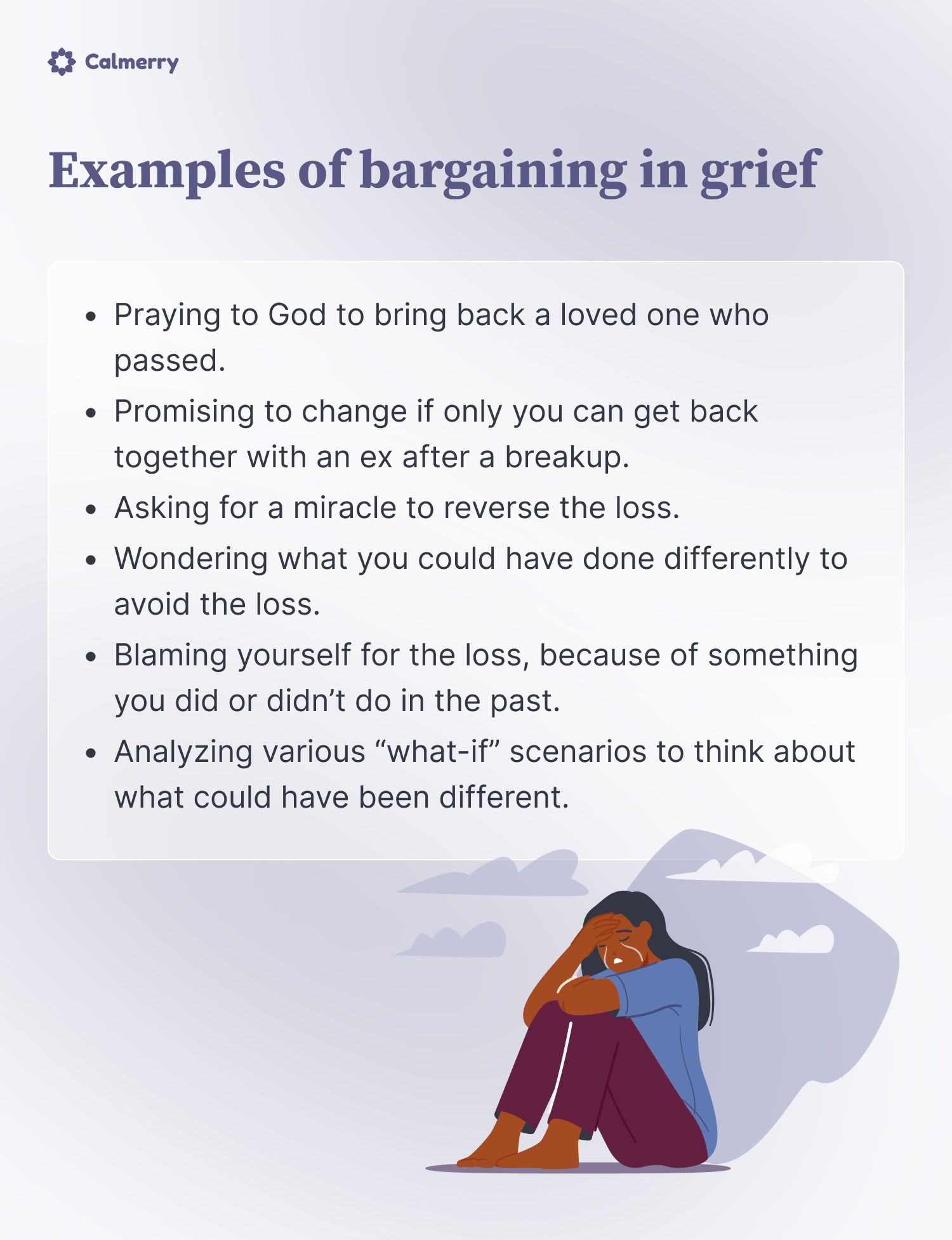What Is the Bargaining Stage of Grief?

In this article
Coping with a loss can be challenging, and it’s normal to go through a grieving process. This process can look a little different for everyone.
The five stages of grief model is based on the work of Elisabeth Kubler-Ross, who posited the model in 1969. [1] Lim, W. M. (2013). REVISITING KUBLER-ROSSâ’S FIVE STAGES OF GRIEF: SOME COMMENTS ON THE IPHONE 5. Journal of Social Sciences, 9(1), 11–13. https://doi.org/10.3844/jssp.2013.11.13 Based on her theory, a person progresses through these stages: denial, anger, bargaining, depression, and acceptance, as they grieve.
While this model is often offered as an explanation for the grieving process, it’s helpful to understand that not everyone follows these stages. Furthermore, people may not progress through these stages in the listed order.
Nonetheless, Kubler-Ross’ model is often used to frame the grieving process, so we can understand what a grieving person may experience. It can be especially helpful to understand the bargaining stage of grief, because some research suggests it might be a central component of processing grief.
For example, in a study of women coping with failed in-vitro fertilization, bargaining was the most common grief response. [2] Lee, S., Wang, S., Kuo, C., Kuo, P., Lee, M., & Lee, M. (2010). Grief responses and coping strategies among infertile women after failed in vitro fertilization treatment. Scandinavian Journal of Caring Sciences, 24(3), 507–513. https://doi.org/10.1111/j.1471-6712.2009.00742.x This may not be the case for every type of grief, but we at least know that bargaining is common for some grieving people.
Given this fact, it can be beneficial to frame grief within the context of the bargaining stage.
What is bargaining in grief exactly?
So, what are popular grief models referring to when they discuss bargaining?
The bargaining stage is characterized by attempts to negotiate the loss. [3] Grochot, M. C. R. (2018). Death and the Grieving Process: Transactional Analysis Contributions. International Journal of Transactional Analysis Research. https://doi.org/10.29044/v9i2p72
A person may make promises that they will do something differently if they can regain what they’ve lost, or they may pray to a higher power to have their loved one (or the lost person or object) back in their lives.
What happens in the bargaining stage of grief?
During the bargaining stage, a person negotiates and ruminates over the loss, hoping that if they make some sort of “deal” with a higher power, the loss will be negated, or life will somehow be better.
They might promise to themselves or to God, for example, that they will change their behavior if only the loss can be negated.
Or, they might ruminate over things they could have done differently in the past to avoid the loss.

What does the bargaining stage of grief look like?
The bargaining stage of grief often involves ongoing rumination or “what if” thinking.
A person may constantly ask, “What if I had done this differently?” Along with rumination, they are likely to plead with a higher power to allow them to go back in time and change things.
This stage is also likely to involve making promises to do something differently if only given another chance. This might involve promising to do things differently if one can find relief from their suffering, or promising to make changes if allowed to retain what was lost.
Examples of bargaining in grief
If you or someone you love is going through the bargaining stage, it’s helpful to have examples of this stage of grief so you can understand the experience.
Some examples of how bargaining in grief might look include:
- Praying to God to bring back a loved one who passed.
- Promising to change if only you can get back together with an ex after a breakup.
- Asking for a miracle to reverse the loss.
- Wondering what you could have done differently to avoid the loss.
- Blaming yourself for the loss, because of something you did or didn’t do in the past.
- Analyzing various “what-if” scenarios to think about what could have been different.
How to deal with the bargaining stage of grief
Everyone grieves differently, and bargaining can be a normal part of the grieving process. If you’re in this stage, you probably wonder what you can do to move forward.
Below are some helpful strategies for coping.
1. Understand that your feelings are normal
While not everyone experiences the bargaining stage of grief, the reality is that many people do. Research has established that bargaining is a common reaction to loss, so if you’re finding yourself bargaining, recognize that this is normal. [2] Lee, S., Wang, S., Kuo, C., Kuo, P., Lee, M., & Lee, M. (2010). Grief responses and coping strategies among infertile women after failed in vitro fertilization treatment. Scandinavian Journal of Caring Sciences, 24(3), 507–513. https://doi.org/10.1111/j.1471-6712.2009.00742.x
When you convince yourself that your reaction to a loss is abnormal, you’re likely to feel even worse. Knowing that bargaining is common will allow you to feel less alone.
2. Talk with a loved one about what you’re feeling
During the bargaining stage, you might get stuck in a cycle of rumination. Rather than keeping these thoughts to yourself, talk to a supportive friend or family member.
Sharing your thoughts with someone you trust allows you to get feedback from someone on the outside.
This will expose you to a different perspective, which can help you to stop blaming yourself or obsessing over what could have gone differently.
3. Take up journaling
If you’re spending a considerable amount of time thinking about what you could have done differently, journaling can help you process your loss.
Research has shown that writing about thoughts and emotions can help people to see the positives in a stressful situation. [4] Ullrich, P. M., & Lutgendorf, S. K. (2002). Journaling about stressful events: Effects of cognitive processing and emotional expression. Annals of Behavioral Medicine, 24(3), 244–250. https://doi.org/10.1207/s15324796abm2403_10 It’s also beneficial for mentally processing such situations.
When you find yourself caught up in thinking “what if,” journaling can help you to process your thoughts and emotions, and bring you toward healing.
– Dr. Jenni Jacobsen, PhD, Licensed Social Worker (LSW), mental health writer
You might even begin to see your loss in a more positive light with journaling. For example, if you’re grieving the end of a relationship, writing might bring you to the realization that ending the relationship was for the best.
4. Try relaxation techniques
The bargaining stage can create some anxiety, especially if you’re caught up in blaming yourself or wondering what could have gone differently.
You may even find yourself experiencing intrusive thoughts related to your bargaining.
If this sounds like you, it can be helpful to try some relaxation techniques to reduce anxiety.
Techniques like progressive muscle relaxation, meditation or deep breathing can be beneficial as you progress through the bargaining stage of grief. [5] Wilczyńska, D., Łysak-Radomska, A., Podczarska-Głowacka, M., Zajt, J., Dornowski, M., & Skonieczny, P. (2019). Evaluation of the effectiveness of relaxation in lowering the level of anxiety in young adults – a pilot study. International Journal of Occupational Medicine and Environmental Health, 32(6), 817–824. https://doi.org/10.13075/ijomeh.1896.01457
5. Seek professional help
Some people find that they are able to process their feelings and move through the various stages of grief without any professional intervention.
However, for some people, coping can be especially challenging. In some instances, people may find that their grief is long-lasting, and it interferes with returning to daily life.
If you find that symptoms of grief are lingering, or you’re obsessing over what went wrong, you might benefit from grief counseling.
A professional counselor can help you process your feelings and reframe your thinking so that the loss is less distressing. They can also provide psychoeducation to help you better understand what you’re feeling.
– Dr. Jenni Jacobsen, PhD, Licensed Social Worker (LSW), mental health writer
Online therapy can be a suitable option if you’re looking for support for managing grief. An online therapist will connect with you virtually, so you can access support from the privacy and comfort of home.
At Calmerry, we offer online therapy, with licensed mental health professionals. We can match you with grief experts to help you begin your healing journey.
How to support someone at this stage of grief
If a loved one is struggling with the bargaining stage of grief, you probably want to know how you can help.
Consider the tips and strategies below:
Be prepared to listen
Your loved one may need a safe space for expressing their feelings aloud. It’s important for you to offer a listening ear. Be present with them and listen without judging.
Be careful not to interrupt or scold them for how they’re feeling.
Validate their feelings
Even if you don’t entirely understand where they’re coming from, it’s essential for you to validate your loved one’s feelings.
This can be as simple as stating, “I can see this has been very painful for you.”
Or, if your loved one appears to be ruminating over the loss, you could express, “I can understand you’re feeling guilty about what you could have done differently.”
These sort of statements will help your loved one to feel heard.
Try to offer a different perspective
While you don’t want to give unsolicited advice, you can gently offer a different perspective to someone who is navigating the bargaining stage of grief.
This could involve reminding the person they are not to blame for the loss, or reminding them that they could not have possibly predicted the future.
Offer to spend time together
Someone who is grieving may feel quite isolated. They could be worried about burdening others with their pain, so instead of reaching out, they keep to themselves.
Offer to go to dinner with your loved one, or invite them on group outings. Even if they don’t accept every invitation, they will appreciate being included.
Suggest they seek counseling
Everyone processes grief differently, and some people will take longer to heal than others. However, if it’s been quite some time since whatever loss is causing symptoms of bargaining occurred, and your loved one continues to struggle, they might benefit from counseling.
If you notice that your loved one is continuing to withdraw from others and struggling to keep up with daily life, it might be time to suggest they seek help.
Respectfully express that you’re concerned about their well-being, and you know grief counseling can help.
Lim, W. M. (2013). REVISITING KUBLER-ROSSâ’S FIVE STAGES OF GRIEF: SOME COMMENTS ON THE IPHONE 5. Journal of Social Sciences, 9(1), 11–13. https://doi.org/10.3844/jssp.2013.11.13
Lee, S., Wang, S., Kuo, C., Kuo, P., Lee, M., & Lee, M. (2010). Grief responses and coping strategies among infertile women after failed in vitro fertilization treatment. Scandinavian Journal of Caring Sciences, 24(3), 507–513. https://doi.org/10.1111/j.1471-6712.2009.00742.x
Grochot, M. C. R. (2018). Death and the Grieving Process: Transactional Analysis Contributions. International Journal of Transactional Analysis Research. https://doi.org/10.29044/v9i2p72
Ullrich, P. M., & Lutgendorf, S. K. (2002). Journaling about stressful events: Effects of cognitive processing and emotional expression. Annals of Behavioral Medicine, 24(3), 244–250. https://doi.org/10.1207/s15324796abm2403_10
Wilczyńska, D., Łysak-Radomska, A., Podczarska-Głowacka, M., Zajt, J., Dornowski, M., & Skonieczny, P. (2019). Evaluation of the effectiveness of relaxation in lowering the level of anxiety in young adults – a pilot study. International Journal of Occupational Medicine and Environmental Health, 32(6), 817–824. https://doi.org/10.13075/ijomeh.1896.01457
online therapy
live video session


